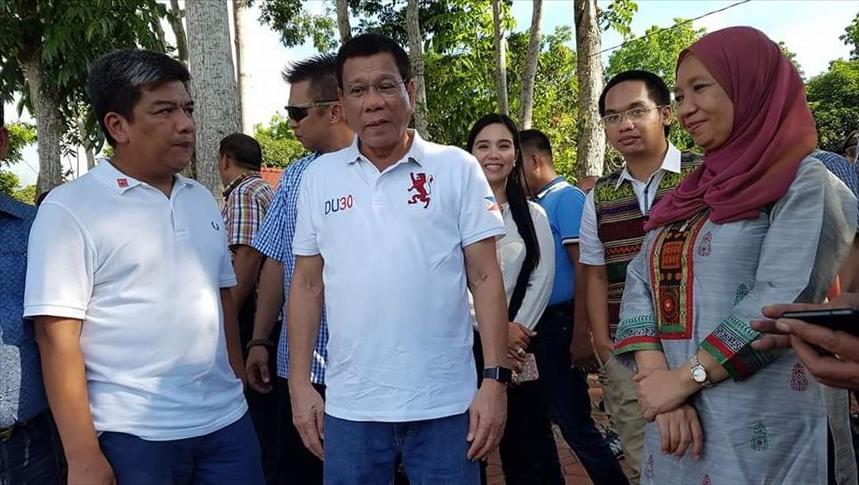Philippines president pleads for peace, end to hatred
In first trip as military commander-in-chief, Rodrigo Duterte talks of ways to address 'historical wrongs' done to Muslims
 Mindanao Governor Mujiv Hataman and other members of the southern Muslim community meet the new Philippines president, Rodrigo Duterte, during his trip to the region Thursday
Mindanao Governor Mujiv Hataman and other members of the southern Muslim community meet the new Philippines president, Rodrigo Duterte, during his trip to the region Thursday
Zamboanga
By Hader Glang
ZAMBOANGA CITY, the Philippines
President Rodrigo Duterte has pleaded for peace and an end to hatred among all rebel groups during Thursday's visit to the troubled southern Philippines.
In his first trip as commander-in-chief of the armed forces of the Philippines, the newly inaugurated leader pitched federalism as one way to address the "historical wrongs" done to Muslims in Mindanao, which he claims fuels rebellion and terrorist acts.
Duterte has proposed to amend the country’s constitution to grant regions more federal autonomy.
Accompanied by defense and security officials, he arrived in Basilan on Thursday to be met by military commanders who have been engaged in an offensive against the Daesh-linked Abu Sayyaf for weeks.
After disappearing into a conference room for a closed-door briefing on the ongoing military operation, he met with local officials led by Autonomous Region in Muslim Mindanao Regional (ARMM) Gov. Mujiv Hataman.
Both men took time out to talk to troops engaged in battle with a group renowned for kidnapping and beheading its victims, but reporters were restricted from taking video and conducting interviews.
Hataman said Duterte's visit boosted the morale of local government leaders and security forces working to address the Abu Sayyaf problem, while complementing local ARMM development programs.
As the two leaders spoke, operations to flush out more than 200 Abu Sayyaf from the mountains of Magcawa in Basilan continued.
Hataman told reporters he had welcomed the news that a comprehensive peace roadmap had received Duterte's blessing -- a roadmap based on a formula presented by Duterte's newly appointed presidential adviser to the peace process, Jesus Dureza.
The fact that the roadmap was approved within a month of the president's appointment shows the administration's commitment to peace and recognizes the urgency of the issue, added the governor.
"The ARMM knows firsthand the effects of a peace process between the government and the Moro Islamic Liberation Front (MILF) that is inclusive and accounts for the realities on ground," he added.
"With the support of the national government, the ARMM has made strides in matters of economic development and has brought basic social services closer to the people."
Hataman praised Duterte's decision to build on the gains of past negotiations and ensure the implementation of long-signed agreements between the government and the MILF.
In 2014, the two signed a peace deal that would have been sealed by a proposed law to replace the current ARMM with a more inclusive Bangsamoro autonomous region.
However, the Bangsamoro Basic Law stalled as Congress adjourned for campaigning for the May 9 polls.
"That his administration has made it a priority to act upon previously mutual agreements, trusting the wisdom of those who have always been at the forefront of the peace negotiations, sets a proactive tone with regard to the peace process, especially when it comes to addressing the Bangsamoro struggle," Hataman said.
"The ARMM regional government has always taken an active role in the struggle for peace and justice and we look forward to working with the Duterte administration in hopes of finally realizing the dreams and aspirations of the Bangsamoro people."
Since 1991, the Abu Sayyaf group -- armed with mostly improvised explosive devices, mortars and automatic rifles -- has carried out bombings, kidnappings, assassinations and extortions in a self-determined fight for an independent province in the Philippines.
Earlier this year, the group beheaded two Canadian hostages after ransoms failed to be paid. It has threatened to decapitate a Norwegian captured with them in September if a P300-million ($6 million) ransom demand is not met.
Two militant groups in the Philippines’ troubled south -- the Bangsamoro Islamic Freedom Fighters and the Abu Sayyaf -- have pledged allegiance to Daesh, prompting fears during the stalling of the peace process between the government and the MILF that Daesh could make inroads in a region torn by decades of armed conflict.




